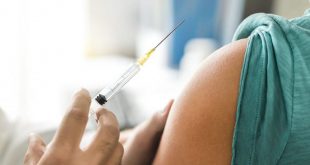A lot has happened in the last few days in the fight against COVID-19. The Food and Drug Administration has granted emergency use authorization for an experimental drug to treat mild to moderate cases of the virus, and preliminary results from Pfizer’s trial show that its vaccine candidate is more than 90 percent effective in preventing COVID-19.
Leading public health experts are also painting a rosier picture. Dr. Anthony Fauci, director of the U.S. National Institute of Allergy and Infectious Diseases and the country’s top infectious disease expert, told CNN that the U.S. could have doses of a COVID-19 vaccine ready to administer to people before the end of the year. He also called the Pfizer results a “big deal.”
World Health Organization director-general Dr. Tedros Ghebreyesus tweeted about the new vaccine results.
“We welcome the encouraging vaccine news from Pfizer & BioNTech & salute all scientists & partners around the who are developing new safe, efficacious tools to beat COVID-19,” he wrote. “The [world] is experiencing unprecedented scientific innovation & collaboration to end the pandemic!”
It all sounds like good news — and experts tell Yahoo Life that it is. But there’s a lot to wade through, and it’s difficult to keep track of everything. Here’s where things stand at the moment.
The Pfizer vaccine
Pfizer announced on Monday that its candidate vaccine was more than 90 percent effective in preventing COVID-19 infection in participants in phase III clinical trials. The study has enrolled 43,538 participants and no serious side effects have been reported. The vaccine uses a newer technology called messenger RNA (mRNA) to prompt an immune response in people who receive the vaccine.
“With today’s news, we are a significant step closer to providing people around the world with a much-needed breakthrough to help bring an end to this global health crisis. We look forward to sharing additional efficacy and safety data generated from thousands of participants in the coming weeks,” Dr. Albert Bourla, Pfizer Chairman and CEO, said in a press release. Based on projections, Pfizer says that it expects to produce up to 50 million vaccine doses in 2020 and up to 1.3 billion doses in 2021.
Other vaccines
There are 11 vaccines in phase III clinical trials, or the final phase, according to The New York Times’ coronavirus vaccine tracker. Like Pfizer, Moderna has a vaccine in phase III — and it uses similar technology. Fauci told CNN that the results from Pfizer “shows that the mRNA platform actually does work,” and cited Moderna as using similar technology.
Eli Lilly’s therapy
On Monday, the FDA granted an emergency use authorization for Eli Lilly’s monoclonal antibody therapy, bamlanivimab. Monoclonal antibodies are laboratory-made proteins that mimic the immune system’s ability to fight off viruses and other harmful agents, the FDA explains. Bamlanivimab specifically targets the spike protein of SARS-CoV-2 and is designed to block the virus’ attachment and entry into human cells.
The therapy, which is administered intravenously, is authorized for patients who test positive for SARS-CoV-2, the virus that causes COVID-19, who are at least 12 years old, who weigh at least 40 kilograms (about 88 pounds) and who are at high risk for severe COVID-19 or could be hospitalized with the virus.
It is now available to be distributed and administered for use.
Other COVID-19 therapeutics
Adv.
- Sun Winning Ind Co: Manufacture of Canvas Bag, Recycle Bad in China
- TheUniTravel.com : Find the latest travel and tourism news from around the world. Stay informed with travel news and updates
Currently, the corticosteroid dexamethasone and anti-viral medication remdesivir are considered the mainstays of treatment for hospitalized patients with COVID-19, Dr. Richard Watkins, an infectious disease physician in Akron, Ohio, and a professor of medicine at the Northeast Ohio Medical University, tells Yahoo Life.
What do doctors think?
“There’s light at the end of the tunnel, both for COVID-19 vaccines and therapeutics,” Dr. William Schaffner, an infectious disease specialist and professor at the Vanderbilt University School of Medicine, tells Yahoo Life. “We’re having some successes, and that’s very exciting.”
Dr. Amesh A. Adalja, senior scholar at the Johns Hopkins Center for Health Security, also tells Yahoo Life that “everything looks promising.”
“Every day, we continue to learn about how the virus works,” Perry N. Halkitis, dean of the Rutgers School of Public Health, tells Yahoo Life. “As a result, we are more able to develop treatments to attack the virus, symptoms of the virus, and manifestations of the virus.”
But, despite the advancements, Watkins says it will still be some time before life can return to normal. “It will be several months, at least,” he says. “There are lots of hurdles still.”
Schaffner agrees. “There are many challenges in the implementation of both these therapies and the vaccines, and we’re going to have to deal with those,” he says. “We shouldn’t get overly excited.”
“These developments don’t mean that today we don’t need to do what we were doing yesterday,” Adalja says. “Although we have these new things coming, they’re not here yet.”
For the vaccine, Watkins points out that it’s unclear at this point how long immunity will last. Meaning, no one knows right now how often someone will need to get vaccinated to get the proper protection. The Pfizer vaccine also requires two doses, taken three weeks apart. “That will make compliance with that vaccine a challenge,” Watkins says.
The Pfizer vaccine is also delicate. “It has very strenuous shipping and handling requirements,” Schaffner says. “It has to be kept very cold and has to be used very quickly because the vaccine degrades very quickly.” That raises a lot of questions about how, exactly, to distribute the vaccine, including whether people would need to go to a specified location to receive it.
For bamlanivimab, it’s “hard to define” who the most at-risk patients are, Schaffner says. Actually administering the medication is difficult, too, he says. “We do outpatient IV therapy, but those are cancer patients — you don’t want a lot of people with COVID-19 going to those locations,” he says. “And the average doctor’s office is not set up to do IV therapy.”
Overall, doctors urge people to be patient, continue to practice known methods of preventing the spread of COVID-19, like wearing masks and practicing social distancing, and know that things may get worse before they get better. “We are going to have a bad next few months,” Watkins says.
“There are no magic wands or bullets here,” Schaffner says. “COVID-19 is not going away.”
 TheFastFashion.com Fashion, Life Style, Beauty, Makeup, Costume…
TheFastFashion.com Fashion, Life Style, Beauty, Makeup, Costume…











